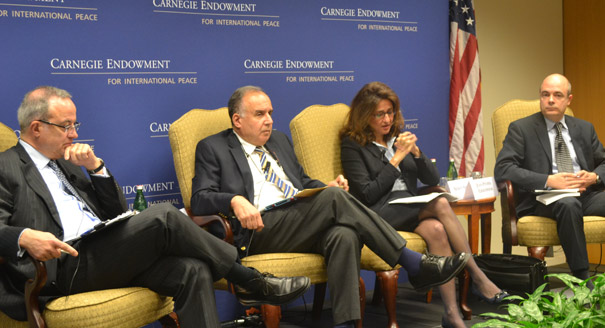Registration
You will receive an email confirming your registration.
More than two years after the outbreak of democratic revolutions in several Middle East and North African (MENA) countries, the economic situation in the region remains precarious. Progress in restoring confidence as well as sustainable and rapid economic growth will depend on internal forces and the return of political stability. External partners may also play a role in helping normalize and eventually improve the underlying growth fundamentals of these economies.
Carnegie hosted the Washington launch of From Political to Economic Awakening in the Arab World: The Path of Economic Integration—a report on trade and foreign direct investment prepared for the Deauville Partnership (World Bank, 2013). Moderated by Carnegie’s Uri Dadush, Carnegie’s Marwan Muasher and Ibrahim Saif joined Nemat Shafik of the IMF and Jean-Pierre Chauffour of the World Bank to discuss the political and economic dimensions of the Arab countries in question as well as the role of external partners.
Economic Conditions
- Uncertainty without Instability: Despite the worsening economic conditions, stability remains. Shafik identified several features shared by the “awakened” countries, including high expectations in spite of the existing tough conditions. Although there has been a shared decline in economic growth, stretch in budgets, and diminishing reserves, there is no macroeconomic crisis on the table, she said. However, fundamental reforms, both political and economic, are necessary and must take place.
- Reform Recommendations: Shafik recommended five significant factors that must be addressed in the conversation on reforms:
- Business Environment: The business environment is inefficient and tends to favor certain actors. Moreover, rent-seekers must become real capitalists.
- Trade: The economies must be more export-oriented.
- Labor: Issues with the labor market and employment must be addressed, including youth unemployment and the participation of women.
- Finance: Greater access to finance and lending must be tackled.
- Subsidies: Untargeted subsidies must be replaced with a more targeted social safety net. Although the subsidies are popular among the poor, the upper quartile is benefitting the most.
- Business Environment: The business environment is inefficient and tends to favor certain actors. Moreover, rent-seekers must become real capitalists.
Political Reforms
- The Political and Economic Go Hand-in-Hand: Greater public engagement and consultation is necessary, as weak tradition of political dialogue inhibits an empowered civil society from participating effectively, Shafik said. The transformation of countries in the Arab awakening cannot be accomplished overnight; it will take time. Muasher argued that inexperience, and not party ideologies, is the key challenge facing governments.
- Time for Transition: Countries not in transition are learning from the experiences of those who are undergoing transition, specifically the implications of a lack of political space and subsequent difficulties in the implementation of reforms, Muasher added. He asserted that governments in the Arab world once believed time was infinite and that reforms could wait forever. However, there are now two groups of countries: countries whose time is counted and countries whose time is now up. The environment has changed in all countries, whether transitioning or not. The countries that have not yet internalized the changes in their environment will eventually be forced to share power. Muasher, agreeing with Shafik, added that governments must establish a plan to address structural problems including unemployment, the fiscal deficit, and subsidies. He stressed the importance of the plan being inclusive, measurable, and shared with civil society.
- Lack of Alternatives: Saif noted that, unfortunately, the capacity to construct policy alternatives is weak, and a high degree of polarization has hindered the transition process. Weak and inefficient bureaucracies as well as widespread rent-seeking placed countries in dire conditions. The need for social dialogue is important, and inclusion of all is imperative to create a balanced discussion, Saif stated.
Role of Partners
- Valuable, Subordinate Role: All panelists agreed that external partners would play an important, though limited, role, and domestic forces would be the main driver of economic reform. Shafik asserted that partners must have a genuine interest in promoting deep market access and pursuing investments in the region.
- Recommendations: Chauffour argued that MENA’s close proximity to Europe—the largest economic market in the world—could help accelerate growth. However, to do so, Europe would have to rebuild trust and confidence in the region, and must nurture its credibility. In order to facilitate a stronger rapport, Chauffour suggested increased market access to products, improving norms and standards, encouraging labor mobility and service liberalization, as well as promoting solar energy exports. However, for the economy to be successful in the long term, Shafik argued that the governments must focus on institution-building. The MENA region must be clearer about its destination point so partners can support the process of transformation.
Outlook
In the short term, the outlook is far from positive, panelists concluded. The lack of consensus and the absence of a real plan and agenda for transformation against the background of shaky international markets and conflict in Syria will inhibit investment. Moreover, Muasher pointed out that the Arab countries can no longer depend on large funding from the rest of the world, to which they have become accustomed. Shafik stated that the IMF will not provide all the financing necessary. Instead, the countries must adjust their systems before they can attract more help from external partners.
